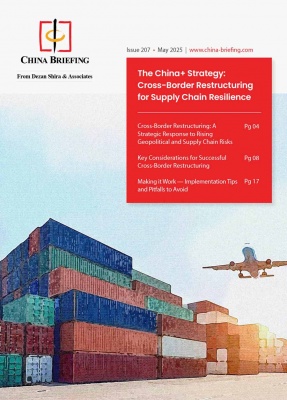NGO Accounting and Compliance in China: Key Highlights
China has recently amended its accounting system for non-governmental non-profit organizations, with the new provisions set to take effect on January 1, 2026. As the number of NGOs continues to grow in the country, understanding the existing and updated requirements is crucial for organizations seeking to maintain regulatory compliance and effectively manage donor funds.
On December 20, 2024, the Ministry of Finance (MOF) unveiled the updated Accounting System for Non-governmental Non-profit Organizations (hereinafter, the “NGO Accounting System”), set to take effect on January 1, 2026.
Among others, the revision of the NGO Accounting System is designed to standardize financial reporting, enhance management practices, and provide a regulatory framework to support the high-quality development of non-governmental organizations (NGOs). As the sector expands and diversifies, new challenges have arisen, such as increasingly varied donation methods, rising foreign investments, and the growing number of NGOs being established. In response to these developments, the updated system aims to address emerging accounting issues and reflect the evolving nature of the sector.
China’s NGO accounting and compliance framework is comprehensive, designed to ensure transparency and accountability within the nonprofit sector. NGOs must navigate complex rules surrounding asset classification, funding restrictions, and financial reporting, all while adhering to specific Chinese regulations. As the number of NGOs in China continues to grow, understanding these requirements is essential for organizations aiming to maintain regulatory compliance and effectively manage donor funds. For any NGO seeking to operate in China, a firm grasp of these accounting standards is critical to sustaining long-term success and credibility.
In this article, we provide an overview of the current accounting and compliance landscape for NGOs in China, explore the key provisions of the new NGO Accounting System, and highlight the significant changes introduced in the revision.
Current effective laws and regulations for NGOs in China
In China, NGOs encompass a wide range of organizations, including social service agencies, foundations, nonprofit schools, medical institutions, religious organizations (e.g., Taoist temples, mosques, churches), and various other social service providers. Much like their counterparts globally, NGOs play a crucial role in addressing social, environmental, and economic challenges. These entities, typically nonprofit, are dedicated to causes such as education, healthcare, environmental protection, and humanitarian aid.
China’s legal framework for NGOs is multifaceted, governed by several key laws and regulations:
- The Law on Administration of Domestic Activities of Overseas Non-Governmental Organizations in China (“NGO Administration law”): Enacted by the Standing Committee of the National People’s Congress, this law provides the regulatory structure for the operation of overseas NGOs in China. It outlines requirements for registration, operation, and permissible activities for foreign NGOs.
- Guide on Registration and Filing for Temporary Activities of Representative Offices of Overseas NGOs: Published by the Ministry of Public Security in 2016, this guide details the process for registering temporary offices of overseas NGOs in China, ensuring their activities comply with Chinese law.
- Accounting System for Non-Governmental Non-Profit Organizations: Released by the Ministry of Finance in 2004 and effective from 2005, this accounting system provides specialized guidelines for NGOs, focusing on the unique financial needs of nonprofit entities. It differs from the accounting framework for business enterprises by addressing issues such as asset and labor donations, restricted and unrestricted net assets, and cost classifications. This was the first accounting system specifically for non-governmental non-profit organizations in China.
- Interpretation of Several Issues in the Accounting System for Non-Governmental Non-Profit Organizations (2020): This document further clarifies the accounting treatment of economic transactions for non-governmental non-profit organizations, addressing practical concerns.
Although the NGO Administration Law and the Guide clearly stipulate that overseas schools, hospitals, research institutes, or academic organizations in natural sciences and engineering can cooperate with their domestic counterparts in China in accordance with relevant state regulations, and are not subject to the provisions of the NGO Administration Law, the specific definitions of these concepts, as well as what “relevant state regulations” refer to, remain unclear. For example, terms like “natural sciences” and “engineering technology” are broadly defined and open to interpretation, which often leads to confusion among overseas NGOs in determining whether they fall under the scope of the NGO Administration Law.
Key accounting features for NGOs in China
Accounting for NGOs requires meticulous tracking of funds and compliance with specific regulations and reporting standards to ensure transparency and accountability to donors, stakeholders, and the public. Unlike the Accounting System for Business Enterprises (ASBE, commonly referred to as CAS), the Accounting System for NGOs imposes unique requirements for handling various types of donations, including asset and labor donations, as well as the management of entrusted agency business, where the NGO acts as an intermediary to transfer assets to a designated beneficiary. The system also differentiates between restricted and unrestricted net assets, outlines specific classifications for the costs associated with business activities, and includes additional disclosure requirements in the financial notes. As more NGOs establish a presence in China, these standards have gained increased attention in recent years.
Below are the key aspects of NGO accounting in China:
Accounting system requirements
Similar to the CAS, the accounting system for NGOs has specific requirements for NGOs to follow in their accounting practice:
- Currency: One of the key requirements is that, while an NGO can choose a currency other than RMB as its functional currency based on the primary economic environment in which it operates, it must use RMB as the presentation currency. This ensures consistency and alignment with the national currency for reporting purposes.
- Foreign currency transactions: Furthermore, the system mandates the use of foreign currency transactions in cases where the NGO engages in cross-border activities or deals in foreign currencies. This ensures that NGOs account for any exchange rate fluctuations and properly reflect them in their financial records.
- Accrual basis accounting: The accrual basis accounting method is also required under the NGO accounting system, meaning that revenues and expenses must be recorded when they are earned or incurred, not when cash is received or paid. This provides a more accurate reflection of the organization’s financial position at any given time.
- Language: Additionally, the accounting records must be maintained in Chinese, with the option to use a foreign language alongside it for bookkeeping purposes. This ensures clarity and accessibility while adhering to the national language requirements.
Net assets classification
NGOs in China do not report shareholder equity, because the resource providers do not enjoy the ownership of the organization, nor do they intend to obtain any economic return for investing resources in the organization. Instead, they classify their financial position in terms of net assets:
- Restricted net assets: These funds are earmarked for specific purposes by donors.
- Unrestricted net assets: These funds can be used at the discretion of the NGO.
This distinction ensures transparency, allowing stakeholders to see how funds are being allocated and whether they are being used for their intended purposes.
Entrusted agency assets and liabilities
If an NGO acts as an intermediary for assets to benefit a third party, these assets and liabilities must be accounted for separately.
Cultural relics and assets
NGOs holding cultural relics and assets must measure these at historical cost.
Financing expenses
NGOs must account for expenses related to financing activities, including:
- Borrowing costs and interest income/expenses
- Exchange gains or losses
- Fundraising expenses, such as promotional activities or materials costs for donations
Practical tips
In addition to the accounting rules, there are several practical tips that can help facilitate bookkeeping for NGOs. These tips primarily focus on the dimension of expenditures and labor fees, which are essential for accurate financial tracking and reporting.
Expenditures should be categorized based on both their nature (e.g., administrative, operational, etc.) and the project or activity they relate to. This dual approach allows for a more detailed breakdown of costs and ensures that financial records are consistent and transparent. The project-related dimension can be further subdivided into two main categories:
- Public welfare projects: Expenses related to charitable or social welfare activities.
- Operational activities: Costs associated with running the NGO’s operational functions.
Labor fees are another important area that requires specific attention. There are several key considerations for recording and processing labor-related expenses:
- Project registration: Labor fees should be associated with specific projects, and these projects must be officially registered to ensure proper tracking and compliance.
- Personnel registration: Personnel who incur labor fees must be properly registered. If not registered, expenses related to their reimbursement will not be approved.
- Invoice requirement: For labor-related expenses to be reimbursed or recorded, appropriate invoices must be obtained. This ensures that expenses are documented and comply with regulatory requirements.
Key financial reporting and disclosure requirements for NGOs in China
NGOs must prepare and submit at least three key financial statements:
- Balance sheet: This document shows the organization’s assets, liabilities, and net assets at a specific point in time.
- Statement of business activities: This document is similar to an income statement, detailing revenue by sources and expenses by nature, along with a breakdown of project-related expenditures.
- Statement of cash flows: This document provides a summary of cash inflows and outflows during a reporting period.
Additional disclosure requirements include:
- Organizational Information: Basic details about the NGO’s mission, organizational structure, and staff.
- Activity Information: A breakdown of ongoing public welfare projects, including budgeted versus actual expenses, and any discrepancies.
- Project Variance Analysis: For each project, the financial report must compare the planned budget with actual expenditures and outline the reasons for any variance.
Special reporting requirements
In addition to the core financial statements, NGOs are required to disclose detailed information regarding their financial status and activities, ensuring transparency and accountability to donors, stakeholders, and regulatory bodies.
Basic Information about the organization
This includes essential details about the NGO such as:
- Purpose: The mission and objectives of the organization.
- Organizational structure: The internal structure and hierarchy.
- Staff: Information on key personnel and their roles within the NGO.
Basic information on activities
NGOs must document their activities in the Statement of Public Welfare Projects, which outlines the nature and scope of the organization’s public welfare initiatives and other key operations.
Detailed disclosure of financial performance
Regulations require NGOs to provide a detailed breakdown of their financial activities, including:
- Stage of completion: The current progress of the annual plan and budget.
- Variance analysis: A thorough explanation of any discrepancies between planned and actual results.
In practice, common disclosures in variances analysis include:
- Project budget vs. Actual expenditure: A comparison of the allocated budget and actual spending for each project, including detailed information on payroll expenses.
- Planned vs. Actual collaborative entities: Comparison of the intended and actual partners or organizations involved in each project.
- Planned vs. Actual implementation entities: Analysis of the entities originally planned for project implementation versus those actually involved.
- Planned vs. Actual implementation areas: Comparison of the intended geographical areas for project activities with the actual locations.
- Planned vs. Actual implementation timeline: A timeline comparison of the planned project schedule and the actual implementation dates.
- Variance explanation: A comprehensive explanation of any differences between the planned and actual situations, including the reasons for the discrepancies.
Additional disclosure requirements
Beyond the standard financial disclosures, NGOs are also required to report other significant matters impacting their business activities. Common additional disclosures include:
- Statement of fixed assets: Details on the NGO’s tangible assets, including any acquisitions, disposals, or impairments.
- Statement of taxes paid: A breakdown of taxes paid by the NGO, ensuring compliance with local tax regulations.
New amendments to China’s NGO accounting system
Effective January 1, 2026, the revisions to China’s NGO accounting system include:
Expanded scope of eligible organizations
One of the primary changes in the revised accounting system is the expansion of eligible organizations covered under the framework. Historically, the system applied only to a limited number of NGO types. The new provisions now extend the scope to include international social organizations, foreign chambers of commerce, and representative offices of overseas NGOs lawfully registered in China. This update aligns with national regulations such as the Civil Code, Charity Law, and Enterprise Income Tax Law. The Regulations on Religious Affairs have also been integrated, unifying terms for religious venues, such as temples, mosques, and churches.
Accounting for service donations
As service donations have become an increasingly common form of support for NGOs, the revised system introduces specific provisions for accounting for such donations. Service donations include non-cash contributions like professional services, volunteer work, or other in-kind donations. According to the amendments, if the NGO receives a service donation that is supported by relevant documentation, such as invoices, and the fair value of the services can be reasonably determined, the organization is required to record the donation based on the documented amount. Additionally, these transactions must be disclosed in the notes to the financial statements.
This change aims to provide clearer guidance on accounting for non-cash donations and ensures that NGOs properly recognize the value of such contributions in their financial reports.
Introduction of risk reserves and special funds
Recognizing the need for NGOs to safeguard against financial risks, the revised system introduces provisions for the establishment of risk reserves and special funds. These reserves and funds are mandated by laws such as the Interim Measures for the Management of Value-preserving and Value-enhancing Investment Activities of Charitable Organizations and the Private Education Promotion Law. The amendment requires NGOs to transfer amounts set aside for risk reserves or special funds into restricted net assets as per legal guidelines. This ensures that the funds are used for their intended purpose and improves the overall financial security of NGOs.
New accounting categories for practical needs
The revisions include the introduction of several new accounting categories to better reflect NGOs’ operational realities:
- Other long-term investments: A new category for investments held for over one year that are neither equity nor debt investments.
- Long-term prepaid expenses: For deferred expenses with amortization periods exceeding one year.
- Prior-year net asset adjustments: To correct errors discovered in the current year’s financial statements.
- Taxes and surcharges: To track taxes and surcharges related to business activities.
- Income tax expenses: For NGOs that may be subject to income taxes.
These new categories help improve the accuracy and transparency of financial reporting by reflecting the full range of transactions NGOs might encounter.
Enhanced disclosure requirements
Transparency is a central focus of the amendments, and the revised accounting system includes enhanced disclosure requirements aimed at increasing the clarity and detail of financial reporting. Key updates include:
- Related party transactions: NGOs are now required to disclose the nature of related party relationships, types of transactions, and transaction details.
- Branch and representative office information: Disclosure of the establishment and operations of branches and representative offices is now required.
- Long-term equity investments: NGOs must provide detailed disclosures on investments in entities where they have control, joint control, or significant influence, including the financial performance and changes in these investments.
- Charitable trusts: NGOs must disclose detailed information on their involvement as trustees or trustors in charitable trusts, including trust establishment, changes, terminations, and management of trust assets.
These enhanced disclosure requirements ensure that stakeholders have a clearer understanding of NGOs’ financial situations and activities, facilitating better decision-making and accountability.
Revised accounting treatment provisions
Revised accounting for restricted net assets
To simplify accounting and enhance clarity, the amendments introduce changes to the handling of restricted net assets. Previously, the system required the reclassification of restricted net assets into unrestricted funds when used. Under the revised system, revenues and expenses are now directly categorized into restricted or unrestricted net assets, and at the end of the period, restricted income and expenses are transferred to restricted net assets without the need for reclassification. This change improves the efficiency and clarity of financial accounting, making it easier for NGOs to track and manage their resources.
Updated accounting for long-term equity investments
The revised system also modifies accounting treatment for long-term equity investments. The previously used equity method and cost method are now replaced with a simplified cost method, which better aligns with the operational characteristics of NGOs. This change is designed to address the fact that NGOs typically do not seek economic returns from their investments and do not have equity ownership in the traditional sense. The new approach simplifies accounting processes and reduces administrative burdens, while also requiring enhanced disclosure of the net profit or loss of invested entities.
Separation of asset impairment losses
To improve the accuracy of financial statements, the amendments separate asset impairment losses from management expenses. Asset impairment losses will now be tracked under a distinct category, ensuring that the nature of the expenses is properly reflected in the financial statements. This distinction clarifies the impact of impairments on the NGO’s financial health and aids in more accurate reporting.
Removal of consolidated financial statement requirement
Based on feedback from the industry, the revised system removes the requirement for NGOs to prepare consolidated financial statements. The removal of this requirement reflects the fact that most stakeholders do not require consolidated financial information and are primarily concerned with the individual financial statements of NGOs. Instead, relevant information will be disclosed in the notes to the financial statements, which should provide sufficient transparency for most users of NGO financial reports.
Key takeaways
The amendments to the NGO Accounting System reflect China’s ongoing efforts to enhance the transparency and accountability of non-governmental organizations. With the introduction of new accounting categories, updated disclosure requirements, and a clearer framework for managing donations and financial risks, NGOs will be better equipped to navigate an increasingly complex regulatory landscape. These revisions aim to streamline accounting practices, improve financial management, and foster greater trust with donors, stakeholders, and the public.
As China’s NGO sector continues to grow, these updates are expected to play a critical role in ensuring the long-term sustainability and success of NGOs in the country. By aligning with international standards and responding to the evolving needs of the sector, these changes will help improve the governance and financial health of NGOs, ultimately supporting their mission to serve society.
About Us
China Briefing is one of five regional Asia Briefing publications, supported by Dezan Shira & Associates. For a complimentary subscription to China Briefing’s content products, please click here.
Dezan Shira & Associates assists foreign investors into China and has done so since 1992 through offices in Beijing, Tianjin, Dalian, Qingdao, Shanghai, Hangzhou, Ningbo, Suzhou, Guangzhou, Haikou, Zhongshan, Shenzhen, and Hong Kong. We also have offices in Vietnam, Indonesia, Singapore, United States, Germany, Italy, India, and Dubai (UAE) and partner firms assisting foreign investors in The Philippines, Malaysia, Thailand, Bangladesh, and Australia. For assistance in China, please contact the firm at china@dezshira.com or visit our website at www.dezshira.com.
- Previous Article China-Chile Economic Ties: Trade, Investment, and Future Prospects
- Next Article US Investment Ban on China: What it Means Now That it’s in Effect

























